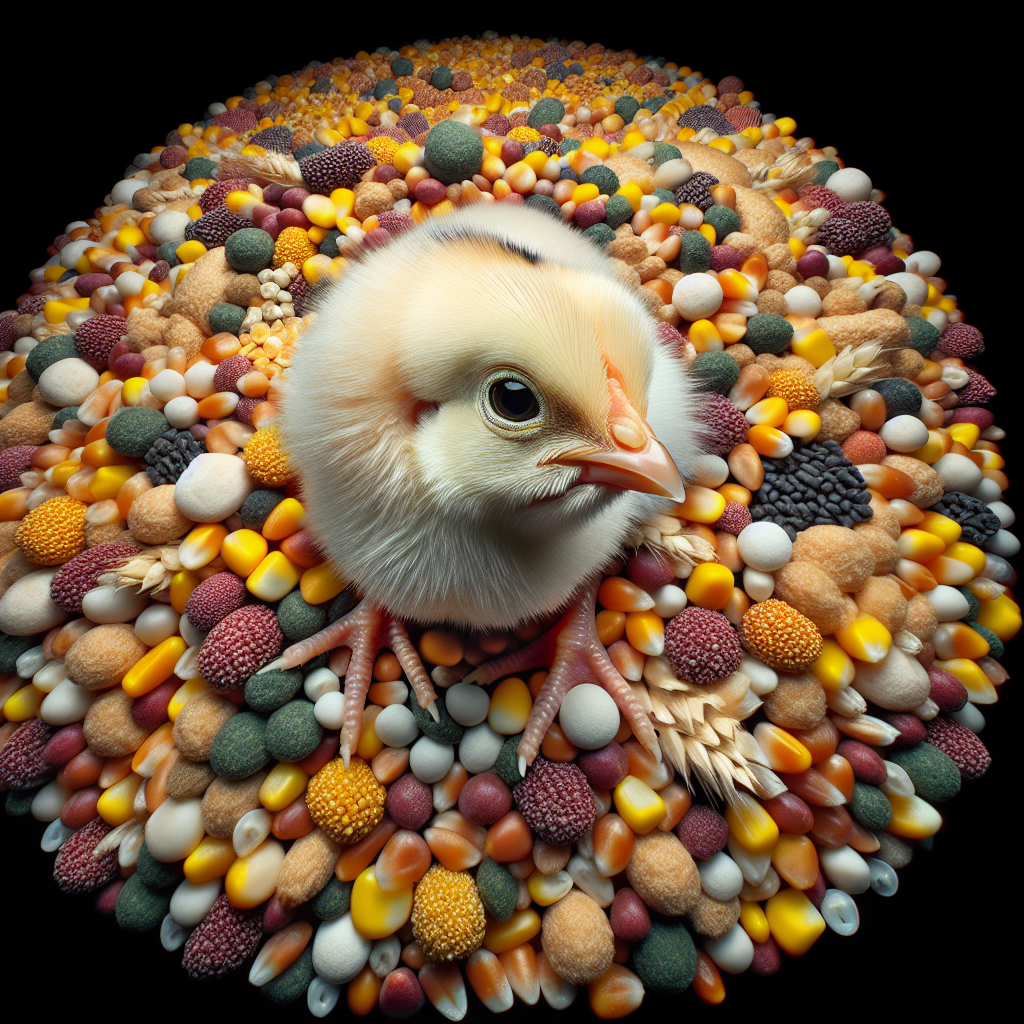In the fascinating world of farming, ensuring the health and well-being of our beloved chickens is of utmost importance. But have you ever wondered, are there organic feed options tailored specifically for different chicken life stages? From the early chick days to the golden years of egg-laying, this article will shed light on the availability and benefits of organic feed options that cater to each phase of a chicken’s life. So whether you’re a seasoned farmer or just starting out, get ready to discover how these specialized feeds can support the growth, development, and overall health of your feathered friends.
Organic Feed Options for Chickens
Introduction to Organic Chicken Feed
When it comes to raising chickens, providing them with the right feed is crucial for their growth, health, and productivity. If you’re considering an organic approach to feeding your chickens, you’re on the right track. Organic chicken feed is made from ingredients that are grown without synthetic fertilizers, pesticides, or genetically modified organisms (GMOs). This means that the feed is free from harmful chemicals and provides a more natural and wholesome diet for your chickens.
Benefits of Organic Chicken Feed
Opting for organic chicken feed offers several benefits for both you and your flock. Firstly, organic feed is more sustainable and environmentally friendly. By choosing organic, you support agricultural practices that prioritize soil health, biodiversity, and the conservation of natural resources. Additionally, organic feed promotes the overall health and well-being of your chickens. It can enhance their immune system, reduce the risk of disease, and improve their digestion and nutrient absorption. Furthermore, if you plan to sell eggs or meat labeled as organic, using organic feed is a requirement.
Popular Organic Feed Brands
There are several reputable brands that offer organic feed options tailored for different chicken life stages. These brands prioritize sourcing high-quality organic ingredients and creating balanced and nutritious formulas. Some popular organic feed brands include Scratch and Peck Feeds, Modesto Milling, New Country Organics, and Kalmbach Feeds. These brands offer a variety of options suitable for chicks, pullets, growers, layers, and breeding hens and roosters.
Understanding Different Chicken Life Stages
To provide the best possible care for your chickens, it’s important to understand their different life stages and their specific nutritional requirements. Chickens go through several distinct stages: chicks (0-6 weeks), pullets and growers (6-20 weeks), layers (20+ weeks), and breeding hens and roosters. Each stage requires different levels of protein, energy, and essential nutrients to support their growth, development, and productivity. Let’s explore the organic feed options available for each life stage.
Organic Feed for Chicks
Nutritional Requirements
Chicks have specific nutritional needs to support their rapid growth and development. They require a diet high in protein, typically around 18-20% protein content in their feed. Additionally, they need essential vitamins and minerals, such as calcium for bone development and vitamin D for proper absorption of calcium.
Popular Organic Feed Options
There are several organic feed options available for chicks. Scratch and Peck Feeds offer a Starter Feed specifically formulated for chicks. It contains a balanced blend of organic grains, seeds, and other natural ingredients to provide optimal nutrition. Modesto Milling also offers an Organic Chick Starter that is free from soy and corn, making it suitable for chicks with dietary sensitivities. New Country Organics and Kalmbach Feeds also have their own organic chick starter options.
Feeding Practices for Chicks
When feeding chicks, it’s essential to provide them with a consistent supply of fresh, clean water and access to their feed at all times. They should be given feed in a shallow feeder or on a clean surface to mimic natural foraging behavior. It’s important to monitor their intake and adjust the feed as they grow to meet their changing nutritional needs.
Organic Feed for Pullets and Growers
Nutritional Requirements
Pullets and growers are transitioning from the chick stage to being ready for egg production or meat consumption. During this stage, they require slightly less protein, typically around 16-18% protein content in their feed. They still need essential vitamins and minerals to support their growth and development.
Popular Organic Feed Options
Organic feed options for pullets and growers include Scratch and Peck Feeds’ Grower Feed, Modesto Milling’s Organic Poultry Grower, and New Country Organics’ Pullet Grower Feed. These feeds are formulated to provide the right balance of nutrients to support healthy growth and prepare the chickens for the next stage of their lives.
Feeding Practices for Pullets and Growers
Similar to chicks, pullets and growers should have access to fresh water at all times. Their feed should be provided in a feeder that allows easy access and minimizes waste. Monitoring their intake and adjusting the feed according to their growth and changing needs is important to ensure they receive the right nutrition.
Organic Feed for Layers
Nutritional Requirements
Layers, the chickens that have reached maturity and started laying eggs, have specific nutritional requirements to support egg production. They require a diet with a lower protein content, typically around 14-16% protein. This reduction in protein allows for the allocation of nutrients to egg development and production.
Popular Organic Feed Options
Organic feed options for layers include Scratch and Peck Feeds’ Layer Feed, Modesto Milling’s Organic Layer Pellets, and New Country Organics’ Layer Feed. These feeds are specifically formulated to provide the necessary nutrients and minerals to support optimal egg production and overall health.
Adjusting Feed Formulations for Optimal Production
Depending on your goals and the specific needs of your laying hens, you may consider adjusting the feed formulations. Some feed brands offer special options, such as feeds fortified with additional omega-3 fatty acids or calcium for stronger eggshells. Consult with a poultry nutritionist or veterinarian to determine the best options for your flock.
Organic Feed for Breeding Hens and Roosters
Nutritional Requirements
Breeding hens and roosters have specific nutritional needs to support fertility, successful reproduction, and overall health. They require balanced diets with appropriate levels of protein, amino acids, vitamins, and minerals. Ensuring their nutritional requirements are met is crucial for successful breeding and healthy offspring.
Popular Organic Feed Options
Brands like Scratch and Peck Feeds, Modesto Milling, and New Country Organics offer organic feed options tailored for breeding hens and roosters. These feeds contain essential nutrients to support fertility, egg production, and overall reproductive health. Some options may include higher protein content or added supplements to address specific needs.
Special Considerations for Breeding Flocks
In addition to a well-balanced diet, breeding flocks may benefit from additional supplements for enhanced fertility, such as organic flaxseed or omega-3 supplements. It’s crucial to provide a calm and stress-free environment for breeding chickens, as stress can negatively impact their reproductive success. Consulting with a poultry specialist can provide valuable guidance on optimizing the health and productivity of your breeding flock.
Transitioning to Organic Feed
Switching from Conventional to Organic Feed
Transitioning from conventional feed to organic feed requires careful planning and gradual changes. Abruptly transitioning can cause digestive upset and stress for your chickens. To transition, start by mixing a small amount of organic feed with the conventional feed and gradually increase the proportion of organic feed over a period of 7-10 days.
Challenges and Tips for a Smooth Transition
One challenge you may face when transitioning to organic feed is the higher cost compared to conventional feed. However, the long-term benefits to the health and well-being of your flock can outweigh the initial investment. To minimize costs, consider purchasing organic feed in bulk or joining a local coop or buying group to take advantage of discounts. It’s also important to ensure proper storage of organic feed to maintain its quality and prevent spoilage.
Supplementation and Treats
Organic Supplements for Chickens
In addition to a well-balanced organic feed, chickens may benefit from some additional supplements. Organic options include probiotics for gut health, apple cider vinegar as a natural dewormer, and organic herbs for respiratory and immune support. Consulting with a poultry nutritionist can help determine the specific supplements needed for your flock.
Healthy Treats for Chickens
Treating your chickens with healthy, organic snacks is a great way to provide enrichment and variety to their diet. Some suitable treats include fresh fruits and vegetables, mealworms, and herbs like parsley, oregano, and basil. Avoid giving them processed or sugary snacks, as these can be detrimental to their health.
Evaluating Organic Feed Quality
Understanding Organic Labeling
When evaluating organic feed options, it’s crucial to understand the organic labeling on the packaging. Look for certifications such as the USDA Organic seal, which guarantees that the feed meets specific organic standards. Reading the ingredient list and ensuring that organic ingredients are listed can also help determine the quality of the feed.
Identifying High-Quality Organic Chicken Feed
To identify high-quality organic chicken feed, look for feed brands that prioritize sourcing organic ingredients and use methods that preserve the nutritional value of these ingredients. Additionally, reputable brands often conduct regular quality control testing to ensure the feed is free from contaminants and provides the necessary nutrients.
Reading Ingredient Lists
Carefully reading the ingredient list on organic chicken feed can provide valuable information about its quality. Look for ingredients such as organic grains, seeds, legumes, and vitamins and minerals. Avoid feeds that contain fillers, by-products, or any ingredients that are not certified organic.
Balancing Costs and Benefits of Organic Feed
Comparing Prices of Organic and Conventional Feed
One consideration when choosing organic feed is the price difference compared to conventional feed. Organic feed is generally more expensive due to the higher costs associated with organic farming practices. However, the long-term benefits of improved health and productivity of your flock, as well as the environmental impact, can make the investment worthwhile.
Quantifying the Health Benefits
While it may be challenging to quantify the exact health benefits of organic feed, many chicken owners report improved overall health, reduced mortality rates, better egg quality, and less susceptibility to diseases in their flocks. Additionally, organic feed provides peace of mind knowing that your chickens are consuming a diet free from harmful chemicals and additives.
Long-term Cost Savings
Despite the initial higher cost of organic feed, there can be long-term cost savings associated with its use. Improved health and disease resistance can result in lower veterinary costs and reduced medication usage. Additionally, if you sell eggs or meat labeled as organic, you can potentially command a higher price in the market, offsetting the initial investment in organic feed.
Frequently Asked Questions
Can organic feed improve egg quality?
Yes, organic feed can contribute to improved egg quality. The higher nutrient content and absence of harmful chemicals in organic feed can result in eggs with richer yolks, stronger shells, and improved flavor.
Is organic feed necessary for backyard chickens?
While not necessary, organic feed can offer numerous benefits for backyard chickens. It supports their health, well-being, and overall productivity. Additionally, if you plan to sell eggs or meat as organic, using organic feed is essential to meet organic certification requirements.
Do organic feed options vary by region?
Yes, organic feed options can vary by region. Availability may depend on local suppliers, feed mills, and organic farming practices in the area. Researching local feed options and connecting with local chicken keepers can provide insights into organic feed availability in your region.
In conclusion, providing organic feed tailored for different chicken life stages can enhance the health and productivity of your flock. From chicks to breeding hens and roosters, there are organic feed options that meet their specific nutritional requirements. Understanding the benefits, available brands, and proper feeding practices can help you make informed choices and provide the best possible care for your chickens. Transitioning to organic feed may require some planning, but the long-term benefits and cost savings are well worth the investment. So, go ahead and choose organic feed for your chickens to ensure they enjoy a natural and wholesome diet.




